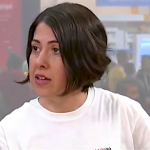 CLOUD
CLOUD
 CLOUD
CLOUD
 CLOUD
CLOUD
It’s well-known in the computing industry that information technology sectors skew heavily male, and the numbers only get smaller for women in leadership roles. Yet Kubernetes, a groundbreaking development in computing software, is proving fertile ground for women seeking recognition as software engineers and project managers.
Last year, SiliconANGLE published a profile of Google’s power women in cloud computing, and this year we’re showcasing the women leading the development and management of Kubernetes.
Kubernetes is already an industry-changing development in the world of computing. Its system of virtual containers has quickly grown to become the most popular and efficient way to run cloud software applications. It’s run through the Cloud Native Computing Foundation, which was created when Google donated Kubernetes to the Linux Foundation, and its open-source nature has attracted broad support across the digital community.
Although it no longer owns the technology it developed, Google still helps manage the community of contributors who work around the clock to improve Kubernetes and the CNCF. And though men dominate the Kubernetes CNCF community, many of the highest-ranking and most important Googlers in Kubernetes are women.
I recently had a chance to interview these high-ranking women, who spoke about their journeys to Google, what attracted them to Kubernetes and their roles as professional women at one of the most powerful companies in the world.
Chen Goldberg (pictured, above and right

Chen Goldberg (Photo: SiliconANGLE)
) is the senior director of engineering at Google Cloud, responsible for a team of hundreds of employees, making sure they’re all equipped to succeed. Goldberg didn’t start out in computer science; she was involved in information technology at the Israeli Ministry of Defense before moving to the private sector.
Following a two-year stint at XOR Technologies, Goldberg moved on to Hewlett Packard Enterprise Co. while earning a master’s in business administration from the Open University of Israel. After graduating with honors, Goldberg stayed on at HPE as the director of engineering for nearly five years before jumping to Google in early 2016.
“What I love about it is actually solving problems and that excites me the most,” said Goldberg. “I think that is where this diverse background really gives me a good perspective to what we are doing and what we are trying to build.”

Dawn Chen (Photo: Google)
Dawn Chen is a senior staff software engineer at Google Cloud and has been in the thick of the Kubernetes community since the beginning. After getting her master’s in computer science from the University of Houston, Chen cut her teeth for a year at GRIC Communications and spent the better part of six years at Symantec Corp. as a software engineer. In 2007, Chen moved to Google, where she was an integral member of the team developing Borg, the predecessor to Kubernetes.
Chen has been on the bleeding edge for over a decade at Google. “Since the day when I joined Google, I think I’ve been involved with Kubernetes in some way and involved with open source, cloud infrastructure in some certain way,” recalled Chen. “When I first joined Borg, we were doing utility computing, which is the former name of today’s cloud.”

Sarah Novotny (Photo: LinkedIn)
Sarah Novotny is the head of open-source strategy at Google Cloud and also serves on the board of directors at the Linux Foundation. Novotny has worn many hats and held very high positions at several companies before making her way to Google.
In the late 1990s, she was a systems engineer at Amazon.com Inc. She spent time in the video game industry, was a program chair at O’Reilly Media, and was the head of developer relations at NGINX Inc. until late 2015, when she found herself at Google working in open source, right when Kubernetes was taking off.
“I attended the first KubeCon my second week at Google,” she said, recalling her time at the conference dedicated to Kubernetes. “I am focused very much on governance and broad project health. Three members of my team are embedded in the Kubernetes ecosystem to manage things like contributor experience and help with governance, as well as work in and on and around Knative and Istio.”
These women are the key movers and shakers in the Kubernetes landscape. Container technology continues to make inroads among developers thanks to its ability to scale out efficiently.
Chen, Novotny and Goldberg constantly speak about their excitement over the Kubernetes platform. Container technology promises to revolutionize an already fast-paced industry. One common refrain heard from these technology pros is the value of community and diversity in the open source and cloud-native world.
Goldberg remarks that Kubernetes is special because it has the potential to help many people across very different fields. “We don’t open-source toys,” she said. “We open-source things that can actually help people and deliver value. I think this is where the open source and the ecosystem has changed things. One of the challenges of teams usually is you build, you integrate into other systems. And with the way we approach Kubernetes, investing in the ecosystem, and the surface of it, we actually helped teams and partners to innovate.”
Novotny echoes those thoughts. She asserts that “we have to invest not only in the code, but also in the community, in the governance and the engagement with people, making sure that there are opportunities for input and impact from people who are end users of the project or who may want to build businesses around the project.”
And though Chen has been working at Google longer than Goldberg and Novotny combined, she still shares the enthusiasm of her peers. “I want people, no matter where in the world, to be able to access my business,” she said.
The women naturally recognize the gender gap in tech and all are looking to promote greater support of women in their field. Despite the heights she has scaled, Novotny said, she has seen her fair share of male counterparts climb higher and faster.
“There’s just a headwind for women,” said Novotny. “Women are also frequently evaluated on work they’ve done as opposed to potential that they have. And that’s, again, not any single decision that’s been a problem. But over 20 years, those decisions drag women in their career trajectory.”
Chen wants to empower her successors and is leading by example. She was the first female “release czar,” now called release managers, for Kubernetes, helping oversee its versions releases into the open-source community.
“I personally feel we need more role models in the industry,” said Chen. “We also certainly need a culture change. If we want to motivate more females, more young girls into science and computer science, we need to have certain cultural change.”
Goldberg recounted her experience with being mentored by positive role models when she first started out, and she now seeks to return the favor. “Pay it forward, I would say,” she said. Still, Goldberg ties everything back to her work, relating how she manages all of those who work on her team.
“We all know what we want to do, and we all know how we do things. We are respectful to each other, we celebrate customer success, and we are obsessed about their success and we’re accountable,” she said. As she put it, “It simply works.”
Support our mission to keep content open and free by engaging with theCUBE community. Join theCUBE’s Alumni Trust Network, where technology leaders connect, share intelligence and create opportunities.
Founded by tech visionaries John Furrier and Dave Vellante, SiliconANGLE Media has built a dynamic ecosystem of industry-leading digital media brands that reach 15+ million elite tech professionals. Our new proprietary theCUBE AI Video Cloud is breaking ground in audience interaction, leveraging theCUBEai.com neural network to help technology companies make data-driven decisions and stay at the forefront of industry conversations.